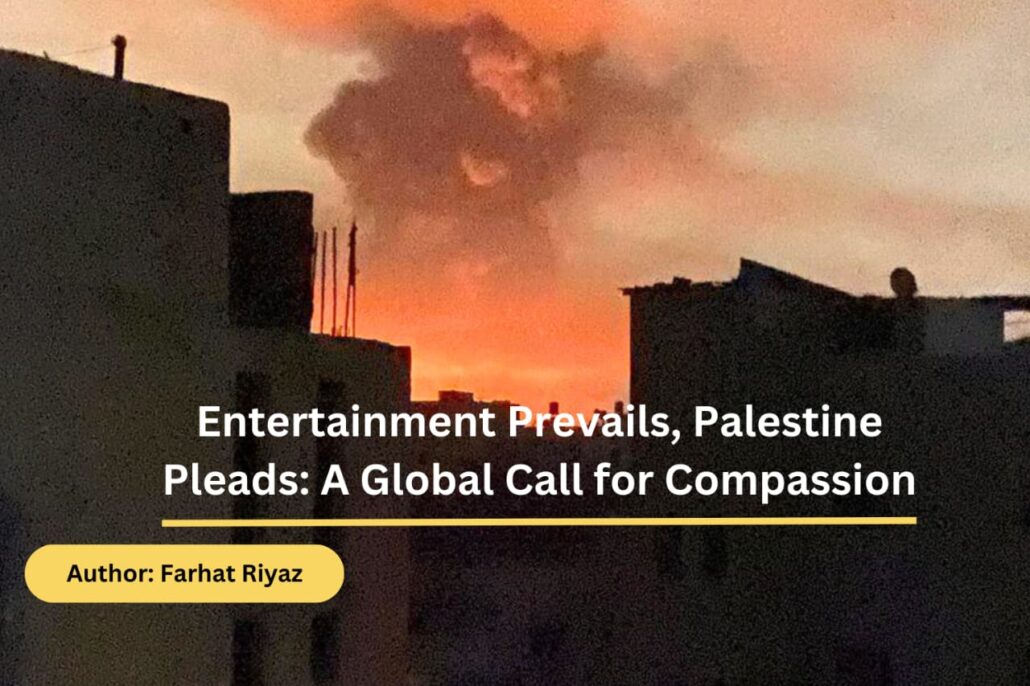
Farhat Riyaz
In the heart of one of the most enduring humanitarian crises of our time, the world witnesses a paradox that leaves a bitter taste in the mouth of empathy. The Palestine conflict, a long-standing tale of loss, despair, and hope, unfolds with new chapters each day. Yet, within the Arab nations appear to be occupied with pursuits that are far from pressing humanitarian concerns.
The perplexing question remains: Why are they seemingly more engrossed in entertainment, such as Shakira’s concert, while their Palestinian friends pop neighbours are struggling to survive? Palestine’s struggle has been etched in history, a testament to human resilience and the enduring spirit of a people faced with relentless adversity.
The lives of Palestinians, whether in the Gaza Strip or the West Bank, have been marked by conflict, uncertainty, and pain for generations. Each day, they must navigate through the wreckage of homes, the echoes of violence, and the heavy weight of an unresolved conflict. The world watches as a theatre of anguish plays out in Palestine, where the lives of innocent children, women, and men hang in the balance.
Families are torn apart, children robbed of their innocence, and dreams left unfulfilled. The images of broken buildings and broken lives flood our screens and stir our hearts. Yet, in some Arab nations, these cries for help seem to fall on deaf ears. The silence of some Arab nations concerning the Palestine conflict should not be seen as a lack of empathy but as a call to align actions with values.
Hosting international artists and entertainment events is a cultural and economic pursuit, but it should not obscure the pressing need to address humanitarian crises. Recently the world watched as Shakira the international pop sensation, graced the stage in some Arab countries for grand concerts that attracted thousands. These events, featuring music, dance, and extravagance, seem to capture the spotlight, diverting attention from pressing issues like the Palestine conflict.
The Presence of Shakira, an artist of immense talent and global recognition, should not be questioned. However, the timing and prominence of these events in the Arab world, juxtaposed with the ongoing suffering in Palestine, force us to reflect. Are we, as a global community, allowing ourselves to be lulled into distraction? Are we prioritising entertainment over the undeniable cries of a people caught in the crossfire of a seemingly endless conflict? The deafening silence from some Arab nations begs these questions.
“Tell the world we are alive, and you are dead.”
It was an Imam who once uttered the powerful words, “Tell the world we are alive, and you are dead.” These words carry a message that is both poignant and stirring. They highlight the contrast between those who suffer and those who turn away, between those whose lives are marked by hardship and those who find solace in distraction.The Imam’s message is not just about hearing but also about understanding and, more importantly, acting. It calls upon individuals and nations to recognise their moral and ethical obligations when witnessing suffering. It challenges us to remember that the strength of one’s faith is not determined by mere words or prayers but by compassionate deeds and actions.
The Palestine conflict is a wake-up call to reevaluate our priorities as a global community. It reminds us that our actions, especially in the face of adversity, reflect our values and character. It urges leaders and governments to prioritise humanitarian concerns and act on their moral and ethical responsibilities.
While we question the silence of some Arab nations, it is crucial to remember that the international community as a whole shares a responsibility in addressing the Palestine conflict. Diplomacy, peace negotiations, and humanitarian aid should take precedence, alongside other global crises. The world must not be indifferent to the plight of the Palestinian people, and it is the collective responsibility of nations to work towards a just and lasting solution.
The desperate plea for assistance emanating from Palestine evokes profound emotions. The pervasive distraction of entertainment in Arab nations is profoundly disheartening lives are being lost, and countless souls await the intervention that can make the difference between life and death. It is a grim reminder that we should not divide humanity along religious lines. This is a matter of fundamental human rights and the sanctity of life and it is a call that should resonate will all is us across the globe.
In a world where unity and compassion should transcend borders, it’s essential for all nations to heed the call of those in distress, like the Palestinian people. A collective effort is required, where diplomatic solutions and humanitarian aid become our primary focus. We must not let entertainment overshadow the urgent needs of those caught in the midst of a prolonged conflict.
The world’s response to the cries for help from Palestine reflects our values and commitment to peace. The path to resolution lies in recognising our shared responsibility as a global community to work tirelessly for a just and lasting solution.
(Farhat Riyaz is co-founder of We The Kashmir Foundation)
Disclaimer: These are the personal opinions of the author.




